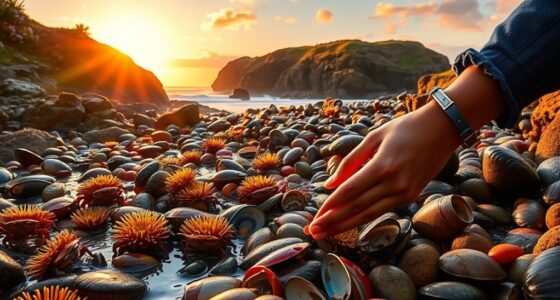When foraging along coastlines, you need to understand local laws that protect marine life and habitats. Regulations vary widely by region, often requiring permits for certain species and restricting access to protected areas or endangered species. Violating these rules can lead to hefty fines or legal trouble. To guarantee you stay compliant, learn about permits, seasonal limits, and protected zones. If you continue, you’ll discover how to navigate these regulations responsibly and sustainably.
Key Takeaways
- Coastal foraging laws vary regionally, with some areas permitting sustainable harvesting and others imposing restrictions or bans.
- Permits or licenses are often required for collecting in protected areas or targeting specific species.
- Collecting protected, endangered, or species in habitat-restricted zones is illegal and strictly enforced.
- Violations can result in hefty fines, confiscation, or criminal charges, depending on severity and jurisdiction.
- Staying informed about local regulations and obtaining necessary permissions ensures legal and responsible foraging.
Overview of Coastal Foraging Regulations
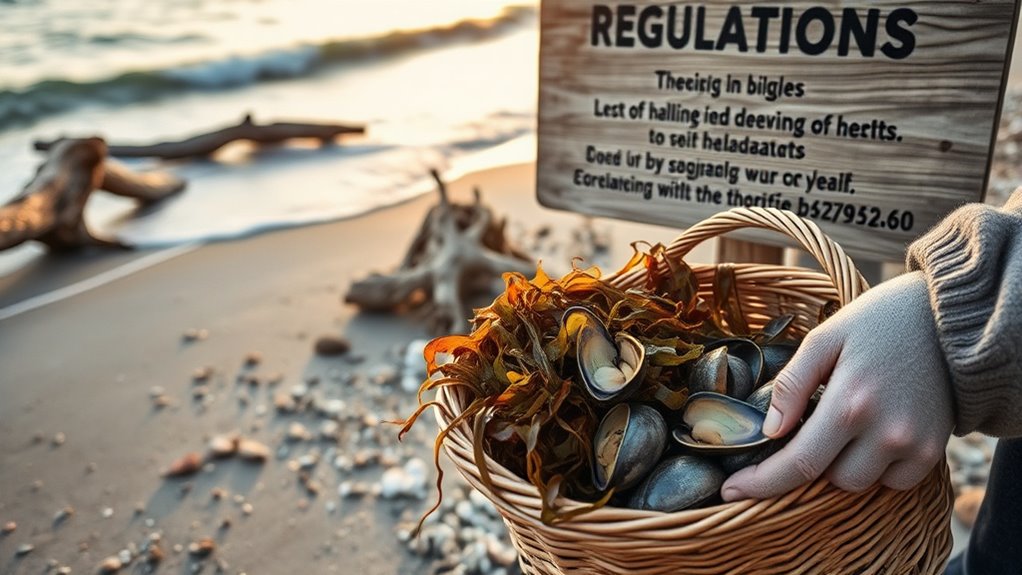
Have you ever wondered what rules govern coastal foraging? Coastal foraging regulations vary widely depending on where you are. In some regions, sustainable harvesting is permitted, but strict restrictions or bans aim to protect marine ecosystems. For example, in the UK, gathering seaweed and certain shellfish is usually allowed from public beaches, but commercial activities often require permits. In the US, federal rules prohibit harvesting in national parks unless explicitly authorized, while some states and local jurisdictions allow limited foraging. Many regulations control how much you can take and when, to prevent overharvesting and safeguard species. Environmental agencies enforce these rules, especially against collecting protected or endangered species, emphasizing sustainable practices to minimize ecological impact. Always check local regulations before you start foraging.
Permits and Licensing Requirements

To legally forage along the coast, you often need to obtain permits or licenses, especially when collecting from protected areas or targeting specific species. Permits are typically required in regulated zones, including Marine Protected Areas (MPAs), where collection without authorization is illegal. Regulations often specify seasonal permits, limits on the quantity and types of resources you can harvest, and whether the activity is recreational or commercial. Some jurisdictions make permits mandatory, while others have simpler registration processes for recreational foragers. Enforcement agencies usually require proof of permits during inspections, and violating these regulations can lead to fines or legal penalties. It is also important to be aware of coastal foraging restrictions that may be in place to protect local ecosystems. Additionally, understanding regulatory frameworks can help ensure compliance with all legal requirements. Being aware of common pitfalls can prevent unintentional violations and support sustainable foraging practices. Staying informed about environmental impacts associated with foraging activities can further promote conservation efforts. Recognizing the importance of community engagement and local conservation initiatives can enhance sustainable practices and foster cooperative management. Always check local rules beforehand to guarantee your foraging aligns with current permits and regulations.
Protected Species and Habitat Restrictions

Many coastal regions enforce strict regulations to protect vulnerable species and habitats, making it illegal to forage from certain areas or target specific organisms. Protected species like sea turtles, seabirds, and endangered shellfish are off-limits to prevent disturbance and harm. Habitat restrictions often prohibit collecting plants or animals from sensitive zones such as salt marshes, dune systems, or nesting beaches, helping preserve ecological integrity. Some species of seaweed and marine invertebrates are protected under local laws, requiring permits or banning harvests altogether in designated zones. Collecting endangered species like the European eel or specific shellfish is illegal almost everywhere, with severe penalties for violations. Seasonal closures and buffer zones around breeding sites further ensure the reproductive health of protected species. Understanding environmental considerations is essential to ensure sustainable foraging practices that minimize ecological impact, emphasizing the importance of conservation efforts in maintaining biodiversity. Additionally, regulatory compliance is crucial to avoid legal penalties and contribute to the preservation of marine ecosystems. Awareness of marine protected areas helps foragers identify zones where collection is prohibited and supports broader conservation initiatives. Implementing best practices can further reduce human impact and promote ecosystem health.
Regional Variations in Coastal Foraging Laws

Coastal foraging laws differ widely across regions, reflecting diverse ecological, cultural, and legal priorities. In some areas like the UK and Wales, regulations are more permissive, allowing for personal collection of certain species. In contrast, many US states have stricter rules, with some banning coastal foraging altogether or requiring permits. International agreements like UNCLOS influence resource management but leave local regulations to regional authorities. Marine Protected Areas often restrict or prohibit foraging activities, with restrictions varying based on management policies. In certain regions, you can forage freely for species like seaweed or shellfish, while others impose limitations to protect ecosystems. Understanding these regional variations in regulations is vital to guarantee you’re compliant and responsible during your coastal foraging activities. Additionally, home decor styles such as aesthetic hooks or wall organization solutions can be used to create a comfortable and organized environment that encourages sustainable practices. Being aware of regulatory compliance and respecting local rules also helps prevent legal issues and supports conservation efforts. Being informed about sustainable foraging practices ensures you contribute positively to ecosystem health and preservation. Recognizing the importance of local ecological conditions can help foragers make better decisions that minimize environmental impact. Moreover, understanding the ecological significance of species being foraged can guide responsible harvesting to ensure populations remain healthy.
Legal Penalties for Violations
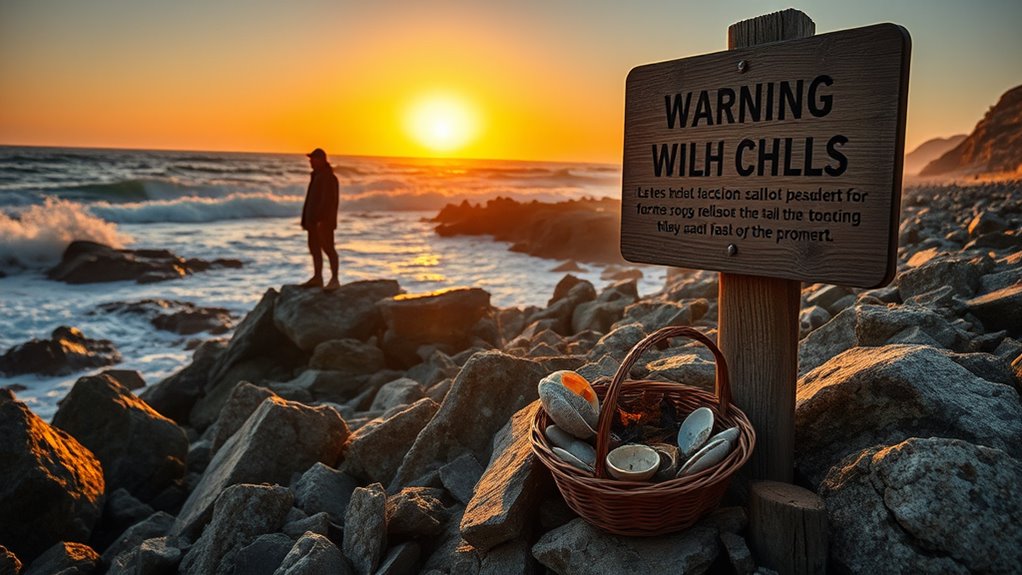
When you violate coastal foraging laws, you risk facing fines that start at $500 and can go up to $2,100 or more, depending on the violation. Enforcement agencies actively monitor for illegal harvesting, and penalties can include confiscation of your foraged materials, criminal charges, or even jail time for serious offenses. Repeated violations lead to harsher consequences, such as increased fines or bans from coastal areas. Additionally, understanding harvesting regulations is crucial to avoid unintentional violations, especially since juice cleansing can impact your overall health and legal compliance. Staying informed about regulatory compliance can help you stay compliant and avoid legal trouble. Knowing the regional legal resources available can also be beneficial if legal issues arise.
Fines and Penalties
Are you aware of the legal consequences of illegal coastal foraging? If you’re caught, you could face hefty fines ranging from $500 up to $2,100, depending on the violation and jurisdiction. Fines are just the beginning—your illegally foraged items can be confiscated, and you may receive a citation or have to appear in court. Violating regulations like harvesting protected species or foraging without permission can lead to criminal charges and steeper fines. Repeat offenses or large-scale illegal foraging increase your risk of jail time. Enforcement agencies patrol regularly to catch offenders, and penalties are meant to serve as a warning. Payment processing systems used by authorities can help track violations and ensure proper enforcement. Additionally, understanding coastal foraging regulations can help prevent violations. – You could lose your foraged treasures forever. – You risk facing criminal charges. – Your wallet could be drained by steep fines. – Your freedom may be on the line. – Understanding headphone regulations can help prevent violations.
Enforcement and Consequences
Violating coastal foraging laws can lead to serious legal repercussions, including hefty fines and confiscation of your foraged items. Enforcement agencies, like local fisheries and coastal authorities, actively patrol foragers and monitor activities along the shoreline. If you’re caught collecting marine resources without proper permission or outside permitted areas, you risk penalties such as fines ranging from $500 to $2,100, depending on the offense’s severity. Harvesting more than allowed or taking attached seaweed can also lead to citations or confiscation of your foraged materials. In some cases, illegal foraging may result in criminal charges or legal action. The enforcement of these laws aims to protect marine ecosystems, and the penalties serve as a deterrent to prevent illegal collection activities.
Sustainable Foraging Practices and Compliance
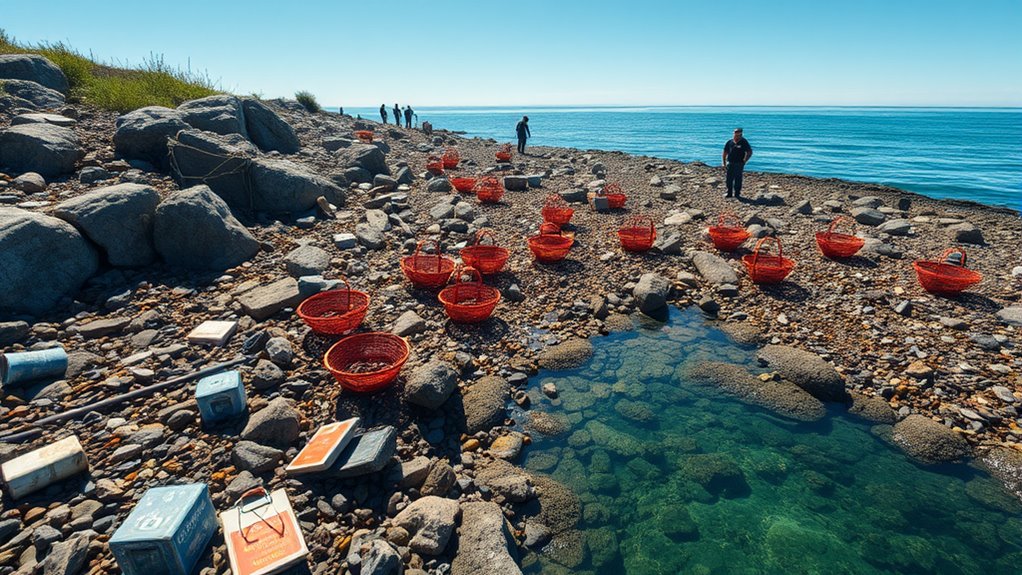
To practice sustainable coastal foraging, you need to respect local regulations and obtain any necessary permits. Harvest responsibly by taking only what you need and avoiding damage to plants and ecosystems. Always guarantee you’re following seasonal rules and guidelines to help protect marine environments for future generations.
Respect Local Regulations
Understanding and respecting local regulations is vital when foraging along the coast. Regulations can vary widely, so always verify rules before you start. Remember, obtaining permissions or permits is imperative, especially on private land or protected areas, to stay within legal boundaries. Ignoring these rules risks fines, damage to ecosystems, and loss of access.
Be mindful of seasonal restrictions and size or quantity limits to avoid illegal collection and protect plant populations. Stay informed by consulting official sources like park authorities and land management agencies to guarantee your foraging is sustainable and compliant.
- Feel the thrill of discovering hidden treasures within legal bounds
- Protect fragile ecosystems by respecting permissions and regulations
- Contribute to conservation efforts through responsible foraging
- Avoid unnecessary penalties by staying informed and compliant
Harvest Responsibly, Avoid Damage
Practicing responsible harvesting is essential to guarantee that coastal ecosystems remain healthy and sustainable. By following sustainable foraging practices, you help protect the environment and ensure future access to resources. Limit yourself to taking no more than one-third of plants or seaweed during each visit to prevent ecological damage. Always identify and collect only legally permissible species from clean, unpolluted areas, avoiding protected or endangered varieties. Use proper tools like scissors or knives to carefully cut at the base, avoiding uprooting or harming root systems. Follow local regulations on seasons, size, and quantity limits. Stay on designated paths to avoid trampling sensitive habitats and disturbing wildlife.
| Practice | Tool Use | Habitat Care | Regulations |
|---|---|---|---|
| Harvest sustainably | Use scissors/knives | Minimize habitat impact | Follow local rules |
| Take only what’s needed | Proper cutting techniques | Avoid damaging roots | Respect species limits |
| Limit collection to one-third | Stay on paths | Protect wildlife | Adhere to seasons |
Obtain Necessary Permissions
Respecting property rights and local regulations is key to sustainable coastal foraging. You must obtain permissions from landowners before foraging on private property to stay legal and respectful. Always check if permits or licenses are required for protected areas, parks, or reserves, and secure them beforehand. Collect only what’s permitted by law, following seasonal and quantity restrictions to avoid harm to ecosystems. Keep documentation of permissions to prove your legal compliance and prevent fines, which can range from $500 to over $2,100 for illegal harvesting. By adhering to these legal guidelines, you help preserve coastal environments and ensure sustainable foraging practices.
- Feel confident knowing you’re respecting landowners’ rights
- Protect ecosystems by following legal collection limits
- Avoid costly fines by securing necessary permits
- Contribute to the sustainability of coastal resources
Navigating Marine Protected Areas

Traveling Marine Protected Areas (MPAs) requires careful attention to the specific regulations that govern each zone, as rules can vary widely depending on management policies. In some MPAs, foraging is permitted under strict guidelines, while others prohibit all extraction to safeguard habitats. Collecting attached seaweed or invertebrates without a permit is often illegal, emphasizing sustainable foraging. Management typically falls to park superintendents, who interpret federal laws and local needs, creating varying policies. To stay compliant, familiarize yourself with local rules before foraging in MPAs. Here’s a quick overview:
| Aspect | Permitted Activities | Restrictions |
|---|---|---|
| Foraging | Limited species, with permits | No collection without approval |
| Habitat Protection | Avoid disrupting sensitive areas | No extraction in protected zones |
| Enforcement | Varies by park, with monitoring | Penalties for violations |
Knowing these differences helps you forage responsibly.
The Role of Local Authorities and Enforcement

Local authorities play a pivotal role in enforcing regulations that govern coastal foraging, ensuring that activities stay within legal boundaries and protect marine ecosystems. They issue permits to control access and monitor compliance through patrols and inspections. Enforcement helps prevent illegal harvesting of protected species and overharvesting that harms ecosystems. Penalties for violations can include fines, confiscation of foraged items, or criminal charges, depending on severity. Many areas designate specific zones where foraging is allowed, with authorities controlling entry and usage rights. These enforcement efforts safeguard marine life and promote responsible foraging practices.
- Protecting marine ecosystems from reckless harvesting
- Ensuring fair access through permits and regulations
- Making violators accountable with strict penalties
- Promoting community involvement via reporting systems
Advocating for Clearer Coastal Foraging Policies
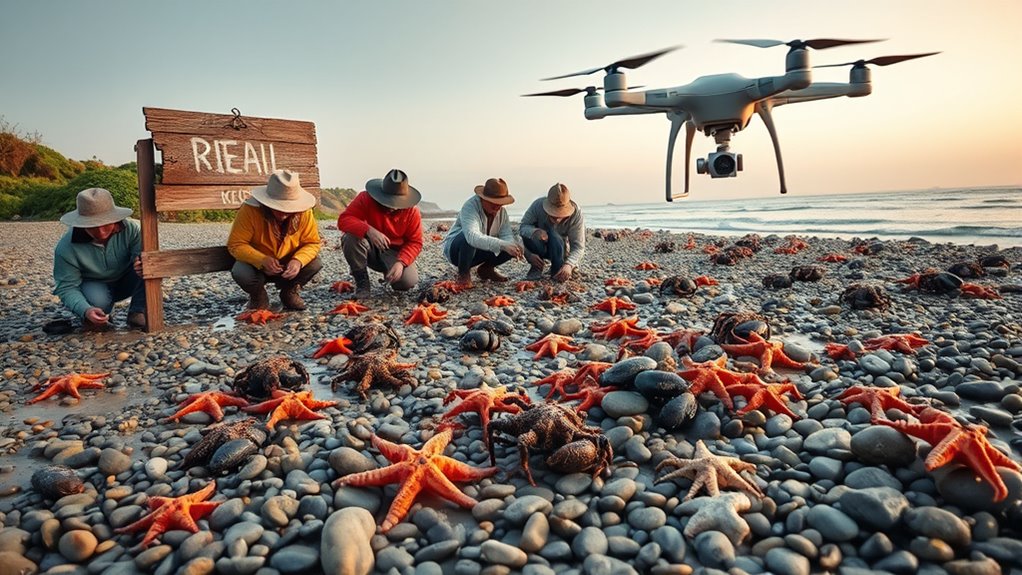
Without standardized regulations, coastal foraging can become confusing and inconsistent, leaving foragers uncertain about what practices are legal. You need clear policies that specify sustainable harvesting limits, permitted species, and seasonal restrictions to protect ecosystems. Advocating for stricter regulations across jurisdictions will reduce enforcement challenges and help you understand your legal rights. Educational initiatives and official signage can inform you about legal foraging practices, promoting responsible harvesting. By supporting comprehensive and transparent regulations, you help balance conservation with community engagement. Clearer policies not only safeguard coastal environments but also make foraging safer and more sustainable. As a forager, your advocacy can lead to better regulations that clarify what’s allowed, ensuring everyone can enjoy coastal resources responsibly.
Frequently Asked Questions
Is Foraging Legal in the US?
You wonder if foraging is legal in the US. It varies by location, so you need to check local laws. In some states like Alaska and Hawaii, it’s more permitted, but many national parks and city parks ban foraging without permission. On private land, you can forage legally if you have the owner’s consent. Always research specific rules before you start to avoid fines or legal issues.
Is Forage Legal on Public Land?
Imagine you’re a pioneering explorer from the 1800s, but today, foraging on public land isn’t always a free-for-all. You need to check local, state, and federal rules first. In many places, collecting plants without permission is illegal and can land you hefty fines. Some parks allow limited foraging, but many prohibit it altogether. Always seek permission and stay within the law to avoid legal trouble while enjoying nature.
What Are the Rules for Foraging?
When you want to forage, you need to know the specific rules in your area. You can usually gather certain plants or seaweed, but restrictions might limit what and how much you can take. Always get permission if you’re on private land, and follow local regulations to avoid fines. Remember, violating these laws can lead to hefty penalties, so check your local guidelines before you start foraging.
Is Foraging Illegal in Most Local Parks in State or Federal Lands Foraging Is Generally Legal?
You wonder if foraging is illegal in most local parks and whether it’s generally allowed on state or federal lands. In most cases, foraging is prohibited in federal parks due to strict preservation laws. Some state parks allow limited or guided foraging under permits, but many urban parks strictly ban it. Always check local regulations before foraging, as rules vary widely and violations can lead to fines or other penalties.
Conclusion
Understanding coastal foraging laws is your compass to explore responsibly. By respecting permits, protected species, and local regulations, you can enjoy this activity without sailing into legal trouble. Think of these rules as the tide guiding your way—ignoring them risks being swept away by penalties. Stay informed, practice sustainable foraging, and advocate for clearer policies, so you can continue to harvest nature’s bounty while preserving its beauty for generations to come.






